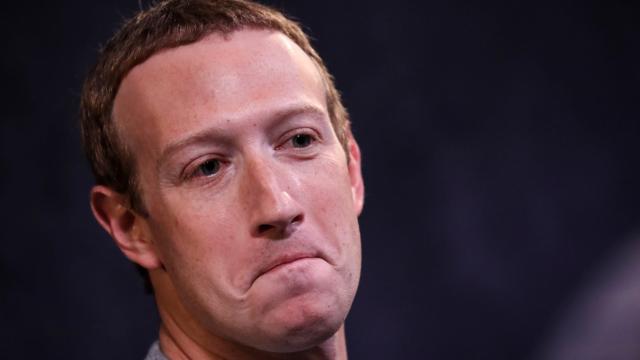Facebook CEO Mark Zuckerberg has an ominous message for the rest of us: You may not like me, but you will understand me.
The sprawling social media giant posted record revenue in Q4 2019 on Wednesday, reported Bloomberg, at $US21.1 ($31) billion. That was 25 per cent growth from the period the year prior, which also makes it “the slowest-ever quarterly sales growth for Facebook, though it topped analysts’ average estimate of $US20.9 ($31) billion,” the news agency wrote. (Facebook has hit a wall in growth because almost everyone already uses it, with 2.89 billion monthly active users this quarter.)
In a call with reporters, per USA Today, Zuckerberg alluded to the numerous crises, scandals, and political headaches confronting Facebook, like hate speech and disinformation, the use of Facebook to enable political lying, and the non-transparent data harvesting operation it has successfully extended over much of the web. And his message is that more of the same is coming.
“My goal for the next decade isn’t to be liked but to be understood,” Zuckerberg told reporters. “One critique of our approach for much of the last decade was that because we wanted to be liked, we didn’t always communicate our views as clearly because we worried about offending people. This led to some positive but shallow sentiment towards the company.”
“In order to be trusted, people need to know what you stand for,” he added. “These positions aren’t always going to be popular, but I think it’s important for us to take these debates head on. I know there are a lot of people who agree with these principles, and there are a lot more who are open to them and want to see these arguments get made. So expect more of that this year.”
Fortunately, Zuckerberg helpfully outlined all the stuff he expects to get shit for over the next 10 years, per Business Insider.
We’re going to focus more on communicating our principles, whether that’s standing up for giving people a voice against those who would censor people who don’t agree with them, standing up for letting people build their own communities against those who say that new types of communities forming on social media is dividing us, standing up for encryption against those who say privacy mostly helps bad people, standing up for giving small businesses more opportunity and sophisticated tools against those who say targeted advertising is a problem, or standing up for serving every person in the world against those who say you have to pay a premium in order to really be served
Note that these are all abstract principles presented in a manner that suggests only gripers who don’t understand what Zuckerberg is trying to do could be opposed to them.
In reality, the problem is that people understand Zuckerberg just fine. For example, the debate about censorship on Facebook isn’t about “giving people a voice,” it’s about whether its moderation efforts are sufficient to prevent Facebook from becoming a vehicle for hate speech. The debate over whether “social media is dividing us” isn’t about whether people can build their own online communities, it’s about whether Facebook actively propagates disinformation and amplifies outrage as part of its business model. The debate over targeted advertising isn’t about “giving small businesses more opportunity and sophisticated tools,” it’s about how targeted advertising is used on Facebook to discriminate and fuels surveillance capitalism. (For what it’s worth, Facebook has rolled out the helping small businesses line as justification for its efforts to set up a world-spanning cryptocurrency cartel opposed by financial regulators and privacy advocates across the globe.) And all of these issues are really about whether Facebook is too big and has too much power to deal with its problems in any way but issuing rote talking points.
Even the encryption thing isn’t as clear-cut as it sounds: Zuckerberg is right that the Department of Justice and authoritarian governments are full of it when they insist that encryption “mostly helps bad people” and demand tech firms build surveillance backdoors into their products. But Zuckerberg has also mixed this point in with Facebook’s pivot to private and small-group communities that supposedly provide what users crave—never mind that it is doing so by merging the technical backends of Messenger, Instagram, and WhatsApp, which conveniently lays the ground for the company to argue it’s somehow now too interconnected to break up.
Zuckerberg is making a big deal about how the future is in private/small-group communication — now that Facebook has built a giant community, people crave smaller spaces, he says on the earnings call.
— Sarah Frier (@sarahfrier) January 29, 2020
People understand Zuckerberg just fine. That leaves him with just people not liking what he’s doing or believing him when he says why he’s doing it. And as he freely told us, there’s a hell of a lot more understanding to come.
